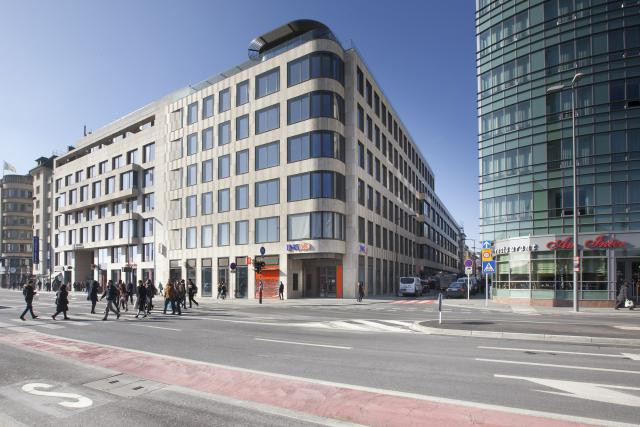“There’s a lot going on in the gare. It’s one of the very lively parts of the city,” mayor Lydie Polfer told Delano on 19 April.
Last year saw the arrival of ING’s headquarters on place de la Gare in the renovated Kons building, the Impulse building above Delhaize will open in the second quarter of 2018, while the new post office building will open in 2022.
Office demand
Its popularity among office and business location is growing. In 2017, the area overtook Kirchberg for office demand, accounting for 27% of total office take-up in the capital, according to JLL, a real estate firm. Rail and bus access are clearly a major attraction. One might assume that low commercial rents are part of the appeal, but the gare is far from the cheapest district. JLL’s 2017 report found Gare office rents averaged €35 per square metre, the same as Kirchberg and higher than the periphery (€22) or Cloche d’Or (€28.50).
Other commercial activities have also mushroomed in the area, with gyms, restaurants, cafés and stores opening in streets which formerly only attracted a less savoury element.

A view of the train station from avenue de la Liberté. Staff photo
A survey conducted with Delano readers found that “affordable shops and restaurants”, “diversity”, “lively” and the fact the area is “a bit more normal than other parts of the city” were what respondents valued most about this district. A 2017 survey commissioned by the city authority concluded the district complemented the city, making it whole.
Maintaining diversity
But, as gentrification takes hold, there is a risk this cherished commercial diversity could be threatened, for example if landlords increase rents. “For the moment, the diversity is there,” Polfer said, adding that the new law on commercial leasing would go some way in protecting tenants. However, she said that there is nothing the city authority can do to interfere. “Business lives through freedom and from opportunities and also from risks,” she said, adding: “The good local businesses, be they restaurants or cafés or shops, live from the customers. The customers come to the shop when what the shop offers is good and the environment is agreeable.”
Startup accelerator Nyuko moved into the House of Startups in the gare area at the beginning of April. Nyuko press officer Lucile Barberet said she had not seen any issues with a loss of diversity so far. “It’s not going to be all businesses and banks. It’s still a central commuter spot, with the buses and trains, you will always have diverse people coming and going,” she told Delano.
Night-time nuisances
While these new developments increase footfall during the daytime, in the evening some parts of the area have become synonymous with drug dealing, prostitution and fights. The majority of respondents to the Delano survey said this was a concern for them, with several saying they did not feel safe in the district at night time.
Increased police patrols and improved street lighting have helped reduce some activity, the city mayor said. There are also plans to install CCTV cameras in key areas close to the school later in 2018. Boosting the resident population to increase footfall and legal activity could be a sustainable solution, however.
Already there are over 10,300 residents in the district, a number that will rise when 47 new homes are built on the Central park development next to rue de Hollerich. And it will exceed 12,000 when a development on the current Paul Wurth and Heintz van Wyck sites is completed. City councillor Isabelle Wiseler in charge of social actions said the city was committed to ensuring a mix of social and private housing in this area, to ensure residential diversity is maintained.

Rue Joseph Junk, opposite the central train station, at dusk. Staff photo
No cleansing plans
As for the homeless people, drug addicts and sex workers who gather in the district, Wiseler did not want to see these vulnerable people pushed out. “That would go completely against my way of approaching the theme,” the councillor told Delano.
She said the proliferation of these activities was connected to the fact that social support structures were concentrated in the district. “This is why it’s important there are different structures. And it’s why we’re happy there will be a drug structure in Esch. We will see if there won’t be another opening elsewhere in the country in future,” Wiseler said.
